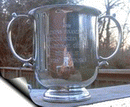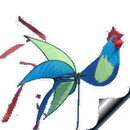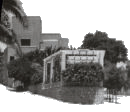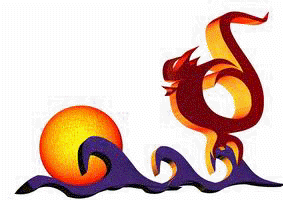
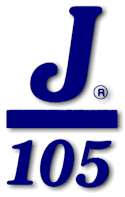 is spelled J/105 but J105, J 105 and J-105 spellings are also found.
is spelled J/105 but J105, J 105 and J-105 spellings are also found.
The J/105 Chantecler, hull #536 June 2001, is a
![]() (J-Europe-built)
J-105. The boats are build by two
licensed manufacturers:
(J-Europe-built)
J-105. The boats are build by two
licensed manufacturers:
![]() (formerly TPI) in the US and
(formerly TPI) in the US and
 in France.
in France.
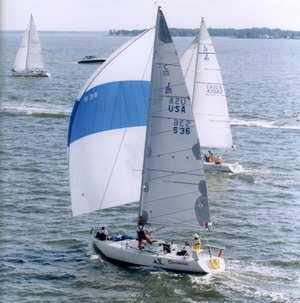 Class
racing in the US is ruled by the
Class
racing in the US is ruled by the
![]()
The
![]() is the original
sportboat (retractable bowsprit and asymmetric spinnaker) that launched the
sprit boat revolution in
1992.
If you are not familiar with the J/105,
here are some independent reviews and guides from
Practical Sailor,
North Sails,
Quantum, Skelley,
BoatUS,
Sailing Anarchy.
is the original
sportboat (retractable bowsprit and asymmetric spinnaker) that launched the
sprit boat revolution in
1992.
If you are not familiar with the J/105,
here are some independent reviews and guides from
Practical Sailor,
North Sails,
Quantum, Skelley,
BoatUS,
Sailing Anarchy.
If you are interested in buying an older US-built J/105, here is a must see document: History of Specification Changes for US-built boats.
Chantecler's history
If you want to know why I ordered a J/Europe J 105 and see pictures, check the Arrival in Baltimore. Check the manufacturer's current web page (http://www.jeurope.eu.com/eng/range/105/j105.html) and its superior SCRIMP construction process (used only on J/105 hulls #155 and above). The specifications that were used for hull #536 are at: J105 Jcomposite Factory specs.pdf
We had fun racing the boat and Team Chantecler got several trophies in offshore and distance racing. Here is our proudest achievement: 2002 BOR
Chantecler and the US J/105 OD Class
This is the most often asked question. Latest developments on US certification are now at: Price
Price
see Price
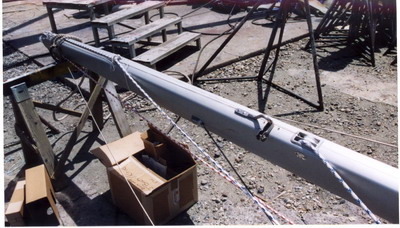 Major features
Major features
For details and pictures, follow this link: Details
For viewing the cabin: Interior
For more pictures: More sailing; More Deck: More Details
| Perfectly equipped for offshore and distance racing or cruising. Sleeps five (when overnight sailing, the V-berth is difficult to use, but the two berths in the main cabin, equipped with lee cloths, and the quarterberth are good sea berths, making the distance sailing comfortable for six). The layout of the cabin is further improved from Pearson Composites' Euro interior (itself an improvement from the original layout) to give the crew more space and comfort. | |
| Sparcraft mast. This OD mast is made by a different supplier than the
Hall Spars mast supplied with Pearson Composites J/105s but has the same dimensions,
characteristics and responds the same way to the backstay. When J/Europe
started production of the J/105, and probably at the request of Llyods of
London, they were able to correct one major
weakness in the Hall Spars mast and made the top tapered section a bit
stronger. The weakness of the top of the Hall Spars mast was the subject of the
J105 Technical Bulletin 4-24-01,
which says:
| |
| Two headsail halyards (a must for offshore sailing, however, one could easily be disabled for OD class racing) | |
| Two spinnaker halyards (again, a must for offshore, however, one could easily be disabled for OD class racing). Each halyard can be configured for either fractional or masthead spinnakers (the class spinnaker is fractional and PHRF penalizes heavily masthead spinnakers, however, IRC and other handicapping systems do not) | |
| Deck accessed anchor well | |
| The bow sprit tube has been custom sealed and made completely waterproof with two new tighter-fitting industrial-strength bowsprit seals and two new tighter bowsprit bearings | |
| Prior to the Annapolis-Bermuda races, the rig and the steering system have been inspected by Marc McAteer of Atlantic Spars & Rigging in May 2002 and again in May 2004 . |
Hull and bottom
| Deep keel (from day one) | |
| The keel and the rudder have been faired | |
| Multi-layers epoxy barrier and new VC-Offshore bottom paint (May 10, 2005) | |
| Bare hull weighted and corrected in accordance with Fleet #3 procedures. Lead added (247.5 lbs) to reach the baseline of 8,580 lbs. | |
| All work professionally done and maintained by Muller Marine |
Deck
| Wheel | |
| Genoa T-tracks and hardware | |
| Secondary T-tracks on rail for barberhauling when reaching | |
| Racing mainsheet system (Dawid double-ended plate and fine tune with swivel base mounted forward of traveler) | |
| Anchor points for rigging a boom preventer | |
| Thurston companionway dodger with side curtains mounted in splash molding with quick-release zipper for easy storage | |
| Foredeck light for headsail changes at night | |
| Windex indicator at masthead with windex light |
Engine
| Volvo 2020 D (same weight and power than the Yanmar supplied with TPI J/105s)- 18 hp - 3 cylinder diesel: Volvo md2020; Reverse gear: MS-10L; Generator: 0.84 kw. The power is rated 13.8 kw at 3600 rpm. The dry engine weight is 112 kg. | |
| The original propeller is a folding 15x9 Eliche Radice geared propeller. The pitch was however a bit short for the boat. A new, more streamlined, Flex-O-Fold 15x11 racing folding geared propeller has been installed early in 2004. Both propellers are provided with the boat. | |
| Fuel tank, capacity 14.5 US gallons (as opposed to 12 US gallons for TPI-built boats), under the Starboard cabin bunk. | |
| Two batteries (engine and house) | |
| Dripless shaft seal |
Sails, Electronics, Comfort, Safety and other equipment
See Details
This site was last updated 05/08/10
